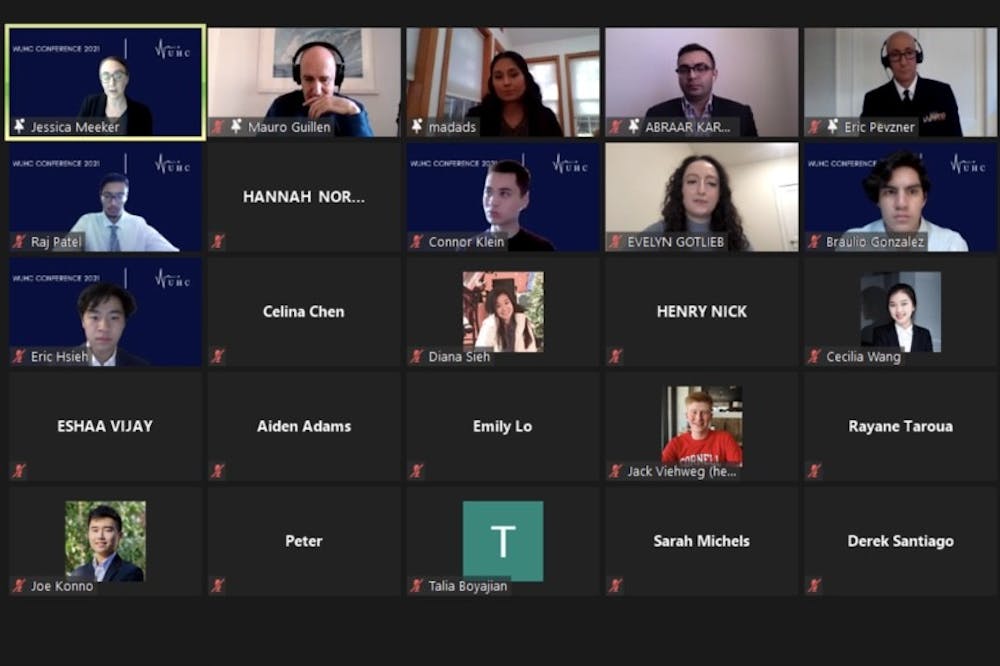
This year's Wharton Undergraduate Healthcare Conference focused on the impact of COVID-19 on the health care industry, featuring speakers from Moderna and NewYork-Presbyterian.
The conference, titled Healthcare in the Wake of COVID-19: The Future of a Changing Industry, took place virtually on Jan. 30. The event included keynote addresses from NewYork-Presbyterian Executive Vice President and Chief Operating Officer Laura Forese and Moderna Chief Medical Officer Tal Zaks, as well as four panels: Health Disparities & Inequities, The Future Of Health Coverage, Outbreaks Of Disease, and Digital Health.
Panelists included legal, medical, and policy experts from a variety of universities and health systems, who shared their experiences with COVID-19. Speakers also addressed the potential long-term impacts of the pandemic on the United States' healthcare system, including an increase in the prevalence of telemedicine, the confrontation of pre-existing health disparities, and the switch to another model of healthcare, such as a single-payer system.
Forese, who oversees operations at 10 hospital campuses in New York, discussed the importance of leadership during the COVID-19 pandemic, focusing on its application to vaccine hesitancy and supply chain coordination. Zaks, a professor of Medicine at the Perelman School of Medicine, discussed the use of mRNA technology in the development of COVID-19 vaccines and other potential uses in healthcare.
During the Outbreaks of Disease panel, panelists discussed the initial response to COVID-19 and attempts to limit its spread.
Abraar Karan, a resident at the Brigham and Women's Hospital and Harvard Medical School, recalled wondering if COVID-19 would be the "next big pandemic" in it's early stages.
"We realized this was going to be really difficult," Karan said. "It’s just been a game of trying to stay afloat.”
Senior Director of the System-wide Special Pathogens Program at NYC Health + Hospitals Syra Madad said one of the biggest challenges involved adjusting to rapidly changing clinical guidance and resource availability at hospitals.
"We’re not used to [the] reuse of PPE, so there was a lot of training that had to go into that,” Madad said.
Panelists also discussed how the COVID-19 pandemic impacted all aspects of life, not just health care. Wharton professor Mauro Guillén detailed the pandemic's impact on globalization and business, while Eric Pevzner from the Centers for Disease Control and Prevention's Epidemic Intelligence Service touched on the role of the CDC and the U.S. government in preventing future outbreaks.
Wharton and College junior and WUHC Conference Chair Eric Hsieh said The Future of Health Coverage panel was particularly interesting because of the diversity of fields the panelists came from, including politics, medicine, and law.
"This led to a back-and-forth discussion about the actual likelihood of a single payer system and about whether employer-sponsored health coverage is sustainable moving forward," Hsieh said.
Despite the virtual format, Conference Committee member and College junior Timothy Lee said WUHC still witnessed high levels of student interaction during the event. Lee said many attendees submitted questions and interacted directly with the keynote speakers, rather than just typing in a Zoom chat.
"It was definitely challenging transitioning to an online Zoom format, while still maintaining the interactive and engaging nature of the WUHC Conference," Lee said. "However, we realized that having this event online opened up a multitude of possibilities in terms of the speakers we could get and who we could market the conference towards.”
The Daily Pennsylvanian is an independent, student-run newspaper. Please consider making a donation to support the coverage that shapes the University. Your generosity ensures a future of strong journalism at Penn.
Donate



